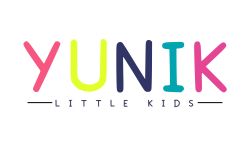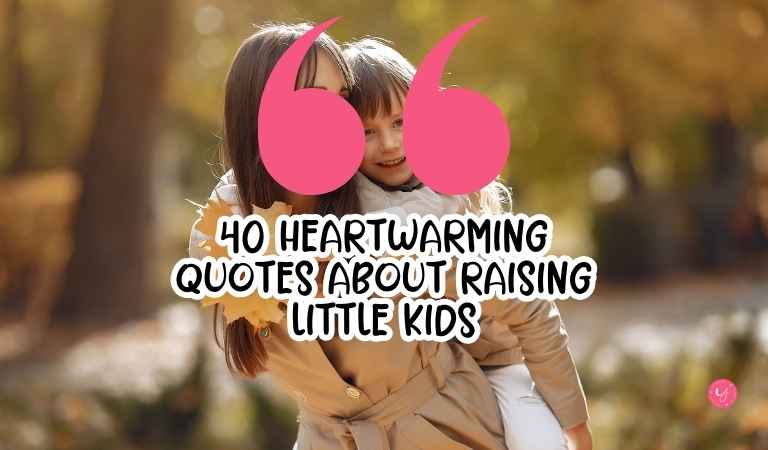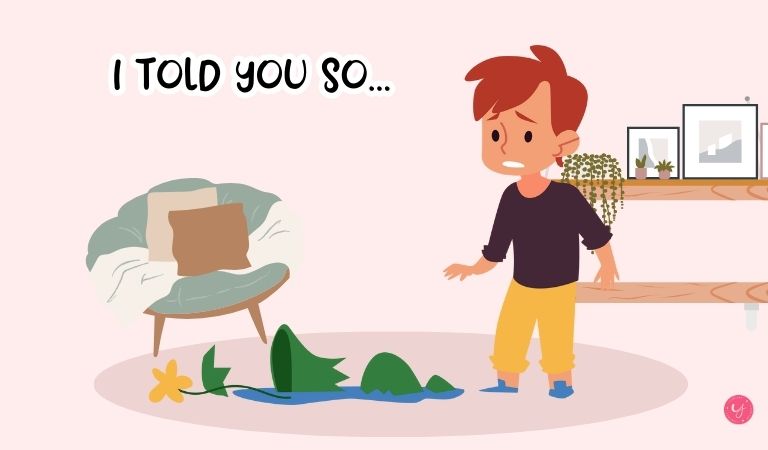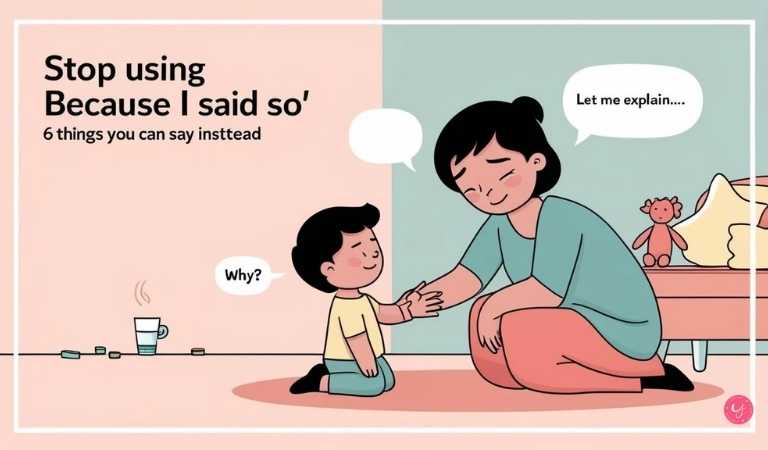10 “Harmless” Phrases Parents Use That Can Hurt Their Kids

As parents, we often say things to our children without considering the long-term impact of our words.
What may seem like a harmless comment to us can be deeply hurtful or confusing to young kids.
Children are highly sensitive to language, and certain phrases can unintentionally damage their self-esteem, confidence, or emotional growth.
Here are 10 common phrases parents use and why they might hurt, along with suggestions for more positive alternatives.
1. “Stop crying. It’s not a big deal.”
I know, right. I have said this many times. Even now I say it sometimes. But what is wrong in this?
This phrase actually dismisses a child’s emotions.
Dismissing a child’s emotions can make them feel invalidated and unsupported. It teaches them that expressing feelings is wrong or unimportant.
What to Try Instead of “Stop crying. It’s not a big deal.”
“I see you’re upset. Can you tell me what’s bothering you?”
This approach acknowledges their emotions and opens up a space for discussion.
2. “Why can’t you be more like your sibling?”
Tempting right? For me, it is.
My 1 year old is kind of the stubborn one who never cries over tiny things. But, on the contrary, my 6 year old cries over every spills and lows.
These days this phrase naturally rushes out. Many times, I bite my tongue not to say it to her. But at times my anger takes over and the words come out.
I know it’s wrong and I try to avoid it as much as possible.
Because, comparing your child to others, especially siblings, can lead to feelings of inadequacy, jealousy, or resentment.
What to Try Instead of “Why can’t you be more like your sibling?”
“Everyone is unique, and you’re doing great in your own way.”
Focus on your child’s individual strengths and efforts instead of comparisons.
3. “You’re fine. Don’t be such a baby.”
Again, as I said, with my 6 year old crying over all the littlest of things, I tend to say this. But, once she literally told me “Ma, I hate when you call me “baby” while scolding. I am really a baby right, not a grown up like you. What do you expect me to do? Please stop.”
I was shocked. From then, I consciously started to make it right. The word literally affected her.
When a child is called a “baby” in a negative sense or belittled for their reaction, it can hurt their self-esteem and discourage them from sharing their feelings in the future.
What to Say Instead of “You’re fine. Don’t be such a baby.”
“It’s okay to feel this way. Let’s talk about what we can do to make it better.”
This reassures them that their emotions are valid and manageable.
4. “Because I said so.”
This phrase may seem like a quick way to end an argument.
I say. You do. End of the argument.
But, in reality, it shuts down communication and makes your child feel powerless or ignored.
What to Say Instead of “Because I said so.”
“I understand you don’t like this rule, but here’s why it’s important.”
When you try to offer an explanation, it helps your child understand the reasoning behind your decisions. Sometimes, they may not be of the age to understand what you say. But your effort matters and there will definitely be a good output in the long run.
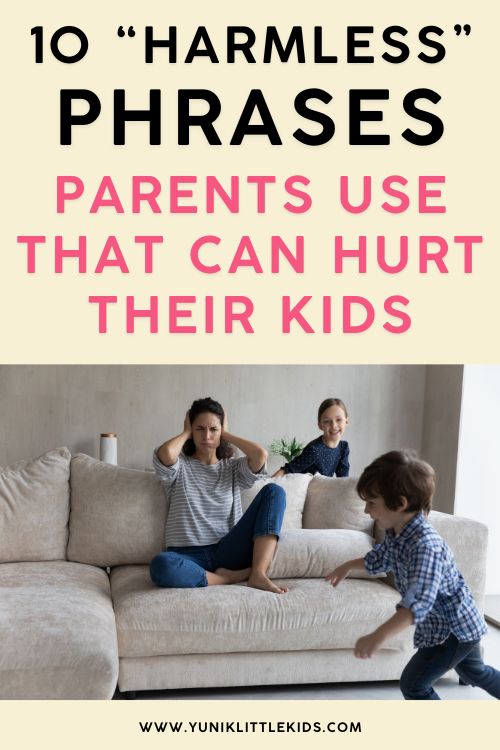
5. “I’m disappointed in you.”
This one stings.
We, as parents, often tend to say it during moments when the child did something completely unexpected, like lying or hurting someone intentionally. The words can just come out, driven by the shock.
But, this phrase can make a child feel like they are a disappointment, rather than just having made a poor choice. It hits their sense of identity, not just their behavior.
What to Try Instead of “I’m disappointed in you.”
“I know you can make a better choice next time. Let’s figure it out together.”
This still sets expectations, but with hope, trust, and connection. You’re saying, “I believe in you,” and kids really need to hear that.
6. “You’re too sensitive.”
My first girl is an emotional one. She cries over the smallest things.
Sometimes, just a tight hug is enough to calm her down.
But I’ll be honest. When we’re around other people, especially in public, I get embarrassed.
That’s when I catch myself saying things like, “Stop being a cry-baby” or “You’re too sensitive.”
But later, I regret it. Because I know what I’m really doing. I’m asking her to stop feeling just to save me from feeling awkward. And that’s not fair.
Labeling a child as “too sensitive” can make them feel ashamed of their emotions and hesitant to express themselves in the future.
What to Try Instead of “You’re too sensitive.”
“I can see this is bothering you. Let’s work through it together.”
It’s a gentle way to acknowledge their feelings without judgment. Over time, this helps them build real emotional strength, not by hiding their feelings, but by understanding and handling them.
7. “Hurry up! You’re so slow.”
I still say this almost every school morning. I try to avoid it but still sometimes slip out.
Handling the toddler and getting the first grader ready, packing bags, and managing breakfast – it’s chaos.
My younger one just wants to mimic every single thing her sister does. So, everything needs to be done for two.
The older one is a dreamer. She’ll start brushing, then pause to tell me something about the previous day or her dream.
And boom, we’re late again.
That’s when the words come out: “Hurry up! You’re so slow!”
But later, I realized she was trying, just at her own pace. That has made, atleast, to reduce the number of times I say those words.
From my personal experience, when someone labeled me as “slow”, it never motivated me to show them my real pace.. It used to literally pressure me, make me over-conscious and it actually chipped away at my confidence.
That’s what I might have been doing to my child.
What to Try Instead of “Hurry up! You’re so slow.”
“Let’s try to finish a little faster. How can I help?”
A consistent reminded of just saying, “Let’s make it faster” without any blame attached can do wonders.
It invites teamwork instead of blame. And it teaches time management without guilt.
8. “Big kids don’t do that.”
This is one phrase that my husband and I strictly chose to avoid saying to my older one after the little one.
We never ever wanted my first girl to feel that things have changed overnight after a little sister has come. It might bring in a slight resentment towards the sibling.
But, no matter how hard you try, some moments make you want to say it.
It can be when your kids have a fight and you expect the older one to act a bit matured or when your older kid simply crawls to your lap to cry for a petty thing.
We tend to say “You are a big kid. Act like one.”
But what we forget is, they are still little, actually.
Just because they are older does not mean they do not need comfort or a safe space to fall apart.
This phrase can shame kids for needing support and push them to suppress emotions to appear “grown up.”
What to Try Instead of “Big kids don’t do that.”
“It’s okay to feel this way. Even grown-ups have hard days.”
This reassures them that emotions aren’t a sign of weakness, no matter the age.
9. “You’re driving me crazy.”
Oh, the number of times I’ve said this under my breath, especially during back-to-back tantrums or when both kids start shouting at the same time.
But I’ve seen how my daughter looks at me when I say it.
She gets quiet. Withdrawn. Sometimes she says it even before i say it.
That’s when it hits me. She’s taking it personally. Like she’s the problem.
Even if we don’t mean it that way, kids can easily absorb that they’re the reason for our stress.
What to Try Instead of “You’re driving me crazy.”
“I’m feeling overwhelmed right now. Can we take a moment to calm down together?”
It shifts the focus from them being a problem to us managing emotions together. A small change, but a big impact.
10. “We can’t afford that.”
I can feel your eye roll. Yes, it is very important to tell kids about finances.
But this particular phrase, when used very often, can cause anxiety or make a child feel guilty for wanting something.
What to Try Instead
“That’s not in our budget right now, but we can save for it or find another option.”
This approach is constructive and helps your child learn about financial responsibility without fear.
Why Words Matter
I know what you might be thinking: Come on, does changing a few words really matter? Kids are little. They probably don’t even notice.
But to a child, every word matters.
Say “Stop crying,” and they may interpret My feelings don’t matter.
Say “I see you’re upset, tell me why,” and they interpret My feelings are safe here.
Over months and years, those small word tweaks has deep impact on the way your child talks to themselves when you’re not around.
Kids borrow our words to calm their own storms.
When we snap “Hurry up!” their bodies gear up for battle, heart racing, brain on high alert. When we try “Let’s finish this together,” we hand them a tiny roadmap back to calm.
The more often they travel that kinder route, the stronger it gets.
So the difference isn’t just politeness or “soft parenting.” It’s daily training in how to feel, think, and cope. Tiny word swaps now become the inner voice your child carries into playground squabbles, teenage exams, and adult setbacks. And that voice, whether harsh or helpful, started with the way we spoke in the everyday moments that felt too small to matter.
Tips for Positive Communication
Let’s be honest. Raising little humans is messy, noisy, lightning-fast work. We won’t always nail the perfect response, and that’s okay.
Here are a few quick habits that I try to practice day to day to help words land softly (as much as possible), even on the stormiest days.
- Pause Before You Speak: Take a moment to consider how your words might be interpreted by your child.
- Acknowledge Their Emotions: Validating your child’s feelings strengthens trust and emotional connection.
- Focus on Solutions: Instead of criticizing, guide your child toward better choices.
- Be Kind to Yourself: Parenting is challenging, and no one is perfect. Acknowledge mistakes and strive to improve.
At the end of the day, we’re all just parents doing our best, learning on the fly while little ears soak up every word. When you swap a quick “Stop crying” for “I’m here, tell me what’s wrong” won’t turn life into a smooth ride, but those small shifts add up. They teach our kids that feelings are welcome and problems can be solved together. They remind us that kindness starts with how we talk.
Some days we’ll get it right, some days we won’t, and that’s okay. What matters is showing up, trying again, and letting our words lead with the love we feel.

